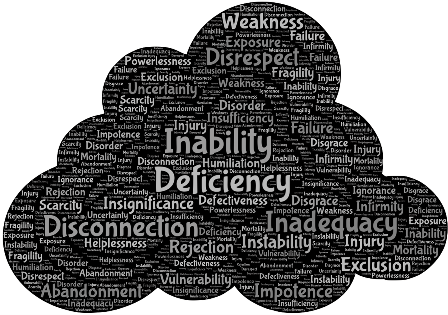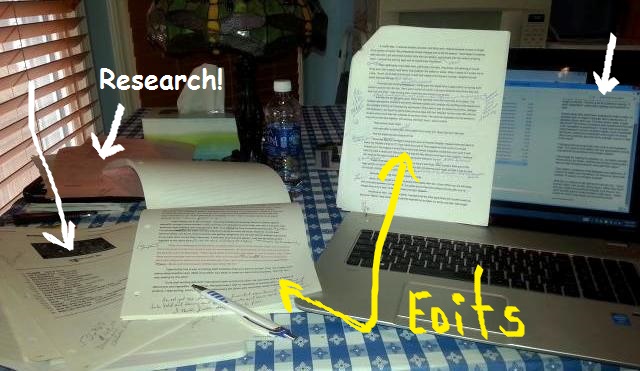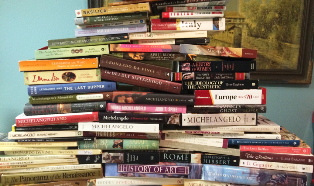The Necessity of The Little Things
The Necessity of The Little Things
Happy May! Hard to believe it’s already a week into the month. Time does seem to fly faster as I get older. Often it feels as though I barely begin a project when the deadline jumps in my lap. Does this happen to you?
Every year, some of the same events push forward on the calendar – award nominations, author book conferences, marketing/publicity renewals – and often interfere with what I want to be doing and that’s working on my writing. But these annual calendar events are important to your work and require the same attention as that fight scene your working on in the novel. However, sometimes it can feel overwhelming and chaotic unless you are organized.

I confess I’m not always organized at home. Cleaning can be delayed, supper can run late, laundry gets pushed a day, grocery shopping forced early….daily stuff can push my buttons. But I plan for those things so why shouldn’t I plan for my other work, the Writer Job?
My Brain, the Calendar
 I’m a child of the desktop Daily Calendar (remember those huge things that covered your desk and became your blotter and your doodle pad?) as well as ye good ol’ Pocket Calendar. Both were used to some degree but neither worked as well as intended. Then along came that hand held monstrosity called the PDA or some other kind of electronic organizers. Or if you pre-date those, you will remember the thick leather binders with calendars, daily to do lists, task lists, contacts, notepapers, and various other organizers in one THICK binder called a Life Planner or Organizer. Big with the old “Yuppie” crowds and young up-and-coming executives. Steal that and you could break a person because it held their entire professional life. It’s why we needed the cloud!
I’m a child of the desktop Daily Calendar (remember those huge things that covered your desk and became your blotter and your doodle pad?) as well as ye good ol’ Pocket Calendar. Both were used to some degree but neither worked as well as intended. Then along came that hand held monstrosity called the PDA or some other kind of electronic organizers. Or if you pre-date those, you will remember the thick leather binders with calendars, daily to do lists, task lists, contacts, notepapers, and various other organizers in one THICK binder called a Life Planner or Organizer. Big with the old “Yuppie” crowds and young up-and-coming executives. Steal that and you could break a person because it held their entire professional life. It’s why we needed the cloud!
Today, after much trial and error, I keep a 5×7 size daily calendar with a monthly overview and I use it. That’s point number one. I like a physical one that I can refer to any time and that does not depend on my being on the computer. There is room for daily notes as well as a monthly overview for a quick glance of scheduled events. I am religious about this thing! I write personal appointments (nails, hair, visits) but mostly I use it for
1. Writer events (writer group meetings, meetings with PAA, library visits, phone calls I need to make)
2. Appearances (conferences, interviews [radio, newspaper, blogs])
3. Deadlines for marketing and promotion by month plus when announcements/results are announced (applying for book awards, starting an ad campaign, working for cover designs, preparing for oral reviews or scheduling book edits) to be sure paperwork is done on time/money is paid, etc.
4. Family appointments that may overlap on scheduled dates.
Keeping organized is the key to maintaining control of your life and sanity. My calendar helps me to do this.
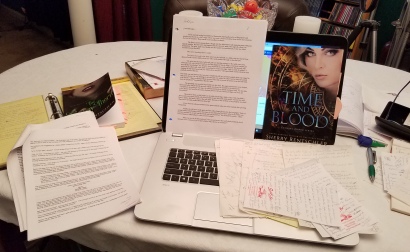
Organization – The File Folder
I’m a paper copy person. I have digital files of everything (cloud, flash drive, DVD, CD) but I also have paper copies of every story, poem, published and unpublished novel, notebooks of ideas (quotes, pictures, stories concepts, character sheets). And I maintain folders.
1. Clips of my published works (articles published in newspaers, magazines and blogs)
2. Copies of articles about me by others (newspapers, magazines, blogs)
3. Public appearances to include my speeches, copies of programs, financial stipends, etc
4. Press Releases (yes you need to do one every time you publish or win an award)
5. Expenditures for marketing, promotions, subscriptions, book orders, anything that I spent money on – and I have subset folders to help me if I spend a great deal.
6. Award applications AND expenditures
7. Earnings by month and a yearly overview (include stipends, honorariums, royalties)
Don’t forget your folders for different books in progress, stories, research (I have tons of folders with stuff I’ve looked up).

And correspondence files. Hard copies of important contact letters, contracts, etc that might need quick reference/proof.
It is a digital world with a paper underbelly. It’s proved invaluable over the years.
Miscellaneous Important Things
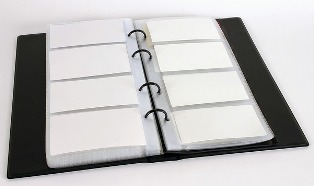 Business Cards – If you go to any event where you meet other authors or any industry professionals (models, designers, photographers, publishers, editors) I hope you are picking up business cards besides all that free swag. When you get home, be sure to put those business cards into your digital rolodex if you keep such a thing. Or if you are like me, I have a card folder. One for authors and one for local businesses I like and out of town ones I want to revisit. Contact cards can be useful when you need help or plan an event.
Business Cards – If you go to any event where you meet other authors or any industry professionals (models, designers, photographers, publishers, editors) I hope you are picking up business cards besides all that free swag. When you get home, be sure to put those business cards into your digital rolodex if you keep such a thing. Or if you are like me, I have a card folder. One for authors and one for local businesses I like and out of town ones I want to revisit. Contact cards can be useful when you need help or plan an event.
Last suggestion. At the end of every work week (you decide how you monitor your work). I use Saturdays to evaluate the past week, organize the leftovers, make notes for the next week, make the requisite lists that seriously resemble “to do.” Post-Its are my friend.

The little things matter and losing touch with them can cause you to feel frayed and disjointed. Managing those little things – or as an old mentor said, “juggling feathers in a hurricane” – will make you feel (and be) more in charge and in control of the bigger things. After all, we are the bigger things and we are our personal, best managers.
____________________________________
Hope you notice the recent updates to the web pages, including the books. More changes to come.
Thanks for stopping by!
I remain, Yours Between the Lines,
Sherry
















